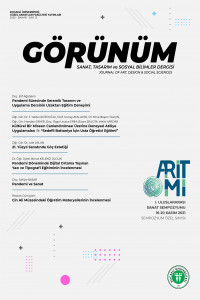Abstract
Dünya Sağlık Örgütünün 11 Mart 2020 tarihinde pandemiyi ilan etmesiyle birlikte Covid-19 salgını tüm dünyada hızla etkili olmuştur. Her alanı etkileyen pandemi ilk anlardan itibaren her sektörü etkilediği gibi eğitim alanını da etkisi altına almıştır. Uzaktan eğitim yapan kurumların yanına örgün olan eğitim alanları da hızla eklenerek dünya yeni bir eğitim anlayışı içine girmiştir. Teorik derslerin yanı sıra Sanat ve Tasarım Fakültelerinin uygulama dersleri de farklı bir boyut kazanmıştır. Teknolojik araçların kullanımı ve dijital platformların sunmuş olduğu etkinliklerle geleneksel birçok yöntem, yerini teknolojik ve sanal ortama bırakmıştır. Bu bağlamda her ders için geliştirilen metot ve ölçekler her geçen gün teknolojinin imkanlarından yararlanılarak gelişmeye devam etmiştir. Tipografi, baskı malzemesini belirli bir amaca uygun olarak doğru şekilde harfleri düzenlemek, boşluğu dağıtmak ve yazıyı kontrol etmek, okuyucunun metni en iyi şekilde anlamasına yardımcı olmak için kullanılır. Tipografi, kullanışlı ve estetik bir son için etkili bir yöntem olarak kullanılmaktadır. Bu araştırmada uzaktan eğitime geçilen süreçte uygulamalı derslerin atölye derslerindeki adaptasyon sorunu incelenmiştir. Grafik tasarım ve iletişim tasarımı bölümlerinde iki dönem boyunca alınan atölye ve stüdyo uygulamalarındaki tipografi dersinin öğrencilerin anlama, kavrama ve uygulamaya bağlı olarak öğrenme süreçleri incelenmiştir.
References
- Ambrose, G., & Haris , P. (2012). Tipografinin Temelleri. İstanbul: Literatür Yayıncılık.
- Arheim, R. (2005). Görsel Düşünme. İstanbul: Metis Yayıncılık.
- Berger, J. (2016). Görme Biçimleri. İstanbul: Metis Yayıncılık.
- Dabner, D., Stewart, S., & Vickress, A. (2020). Graphic Design School. John Wiley & Sons Inc., Hoboken, New Jersey: Wiley.
- Kinross, R. (2010). Modern Typography: an Essay in Critical History. London: Hyphen Press.
- Lupton, E. (2020). Thinking With Type. UK: Princeton Architectural Press.
- Özderin, S. (2018). Grafik Tasarımda Tipografiyi Kullanma Sanatı. Sobider, 210-221.
- Strizver, I. (2006). Type Rules: The Designer's Guide to Professional Typography. New Jersey: John Wiley & Sons, Inc.
- Tova Blum, S. (2017). Typography and the Evolution of Hebrew Alphabetic Script: Writing Method of the Sofer. Xavier University of Louisiana, 49.
- Uçar, T. (2004). Görsel İletişim ve Grafik Tasarım. İstanbul: İnkılap Yayınları.
- Saglik (2021). https://covid19bilgi.saglik.gov.tr/tr/
Abstract
With the declaration of the pandemic by the World Health Organization on March 11, 2020, the Covid-19 pandemic has been rapidly affecting all over the world. The pandemic, which affects every field, has affected every sector from the first moments, as well as the field of education. The world has entered into a new understanding of education by rapidly adding formal education areas to the institutions providing distance education. In addition to the theoretical courses, the practical courses of the Faculties of Art and Design have gained a different dimension. With the use of technological tools and the activities offered by digital platforms, many traditional methods have left their place to the technological and virtual environment. In this context, the methods and scales developed for each course have continued to improve every day by taking advantage of the opportunities of technology. Typography is used to correctly arrange the letters in the printing material for a specific purpose, distribute the spacing and control the writing, and help the reader to understand the text in the best way. Typography is used as an effective method for a convenient and aesthetic finish. In this research, the adaptation problem in the workshop courses of applied courses in the process of transitioning to distance education was examined. The learning processes of the typography course taken during two semesters in graphic design and communication design departments, depending on the understanding, comprehension and application of the students in the workshop and studio applications, were examined.
References
- Ambrose, G., & Haris , P. (2012). Tipografinin Temelleri. İstanbul: Literatür Yayıncılık.
- Arheim, R. (2005). Görsel Düşünme. İstanbul: Metis Yayıncılık.
- Berger, J. (2016). Görme Biçimleri. İstanbul: Metis Yayıncılık.
- Dabner, D., Stewart, S., & Vickress, A. (2020). Graphic Design School. John Wiley & Sons Inc., Hoboken, New Jersey: Wiley.
- Kinross, R. (2010). Modern Typography: an Essay in Critical History. London: Hyphen Press.
- Lupton, E. (2020). Thinking With Type. UK: Princeton Architectural Press.
- Özderin, S. (2018). Grafik Tasarımda Tipografiyi Kullanma Sanatı. Sobider, 210-221.
- Strizver, I. (2006). Type Rules: The Designer's Guide to Professional Typography. New Jersey: John Wiley & Sons, Inc.
- Tova Blum, S. (2017). Typography and the Evolution of Hebrew Alphabetic Script: Writing Method of the Sofer. Xavier University of Louisiana, 49.
- Uçar, T. (2004). Görsel İletişim ve Grafik Tasarım. İstanbul: İnkılap Yayınları.
- Saglik (2021). https://covid19bilgi.saglik.gov.tr/tr/
Details
| Primary Language | Turkish |
|---|---|
| Journal Section | Articles |
| Authors | |
| Publication Date | March 26, 2022 |
| Submission Date | December 26, 2021 |
| Published in Issue | Year 2022 Issue: 12 |
Abstracting
Asos Index

